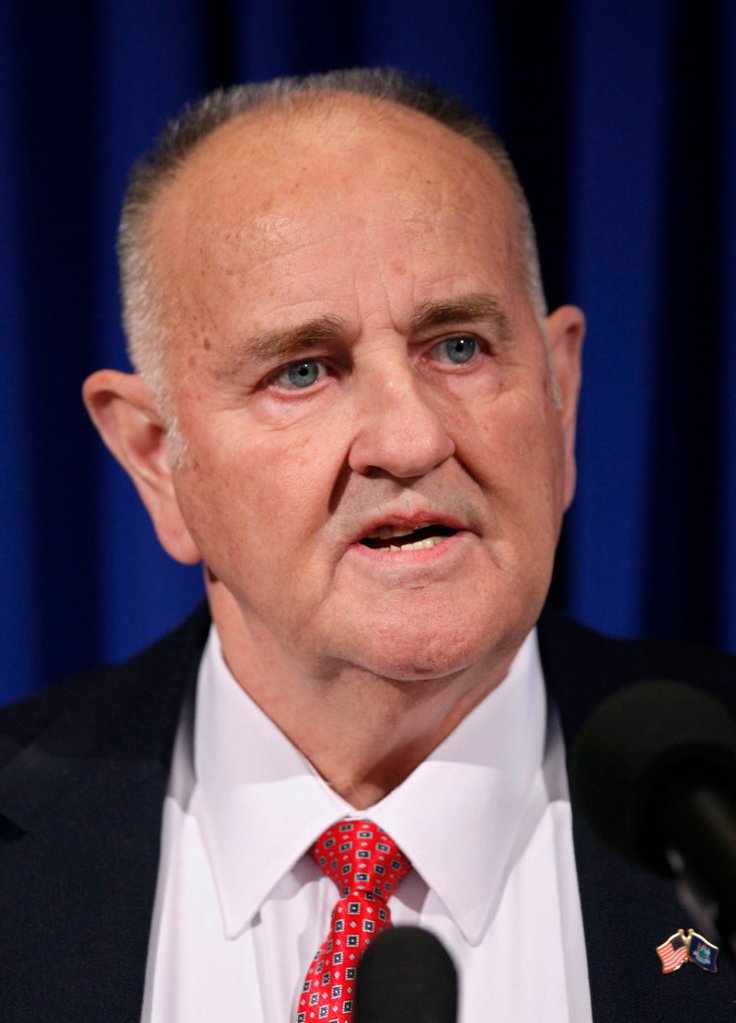AUGUSTA — Municipal officials from cities as big as Portland and towns as small as Mapleton told lawmakers Tuesday that proposed changes in state funding would put more pressure on local property taxes.
In his two-year, $6.1 billion budget, Gov. Paul LePage is proposing to change a revenue-sharing formula that has been used for nearly 40 years. Rather than allot cities and towns 5 percent of state revenue, he’s proposing to set an annual allocation from the state budget.
The change is designed to give municipalities predictable funding, said Sawin Millett, commissioner of the Department of Administrative and Financial Services.
But municipal officials panned the proposal Tuesday, calling it a “mistake” and a break in trust that has developed between the state and its cities and towns.
They noted that the state can opt to give municipalities less than 5 percent of state revenue — as LePage’s budget would do for the two years starting July 1.
“The recurring pattern of legislative actions to take and not replace, unfix then swap, manipulate the tax code and put the stick before the carrot, needs to end,” said Caribou City Manager Steven Buck. “One cannot trust a state who is consistent only in being inconsistent.”
For more than two hours Tuesday afternoon, officials from Augusta, Gardiner, Waterville, Edgecomb, Rockland, Alfred, Brewer, Presque Isle and other places testified against the proposal before the Appropriations Committee. It was the second of 20 days of public hearings on all aspects of the budget.
Millett said many municipal officials have told him that it would be easier to plan budgets if they knew in advance how much money the state would allocate over the next 24 months. As it is now, state revenue — and, therefore, allocations to cities and towns — go up and down with swings in the economy.
LePage’s budget would give cities and towns more money in each of the next two years than they got in this fiscal year. But it would provide 33 percent less than they would receive under the 5 percent formula, based on projected revenue.
Under the current system, municipalities would get a total of $280 million over the next two years. LePage is proposing to allocate $188 million over the same period.
In preparing the budget, Millett said, the administration looked at major cost centers, including money sent to cities and towns. It put a priority on increasing education funding and continuing to support the Homestead Exemption program for property taxpayers.
Portland Mayor Nicholas Mavodones said the revenue-sharing program has helped the city keep property taxes in check.
“Subjecting this program to annual appropriations … would be a mistake,” he said.
The Maine Municipal Association, which has a 70-member policy committee, voted unanimously to oppose repeal of the revenue-sharing program, said Mark Green, president of the association and Sanford’s town manager. He said cities and towns in 38 other states are allowed to charge a local tax to support services, but municipalities in Maine don’t have that option.
“Municipal officials have long been concerned about the relatively high reliance on property taxes in Maine to fund governmental services,” Green said.
Committee members asked Millett several questions about the proposal to drop the revenue-sharing formula. Some asked municipal officials for alternatives. Others said they had concerns about flat-funding cities and towns.
“This predictability comes at a fairly high cost, and the predictability is only for two years,” said Rep. Dennis Keschl, R-Belgrade, a former Belgrade town manager. “As the state suffered, so did the towns, and towns suffered even more because of reductions by the Legislature.”
Millett said the budget – which would require state workers and teachers to contribute more toward their retirement and proposes $200 million in tax cuts – is a balancing act among competing interests. The administration inherited an $800 million funding shortfall that complicated the process, he said.
Lawmakers now can make changes if they wish.
“You have to step back and look at all of this as a puzzle with difficult choices at the root,” Millett said.
MaineToday Media State House Writer Susan Cover can be contacted at 620-7015 or at: scover@mainetoday.com
Send questions/comments to the editors.


